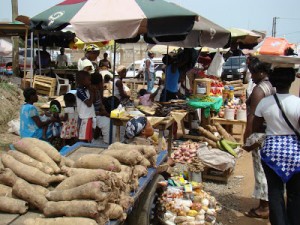Ghana’s economic freedom stagnates – report
 Ghana’s economic freedom in 2016 has shown stagnation from the previous year, according to the 2016 global economic freedom ranking by The Heritage Foundation, a Washington-based think tank, in partnership with the Wall Street Journal.
Ghana’s economic freedom in 2016 has shown stagnation from the previous year, according to the 2016 global economic freedom ranking by The Heritage Foundation, a Washington-based think tank, in partnership with the Wall Street Journal.
The think tank gave Ghana a score of 63 per cent in its 2016 report, ranking Ghana 72nd out of 186 economies and 5th in sub-Saharan Africa.
In a 2015 ranking of World Economic Freedom by Fraser Institute, a Canada-based policy think tank, Ghana showed only a marginal improvement and retained its position from the previous year as 97th in the world, of 123 economies assessed.
Economic freedom is the extent to which governments allow individuals to undertake economic actions freely – free markets, free trade and enterprises, free movement of labour and capital and so on – and it is widely associated with prosperity, healthier societies, poverty elimination, human development, greater GDP per capita and greater wealth per capita.
“Economic freedom is a crucial component of liberty. It empowers people to work, produce, consume, own, trade, and invest according to their personal choices,” The Heritage Foundation says.
The think tank measures it using ten indicators grouped into four broad categories: Rule of Law, Regulatory Efficiency, Open Markets and Limited Government (an assessment of the tax burden and government’s expenditure to GDP ratio).
According to the report, Ghana’s strength lies in Open Markets and the Rule of Law but the rating of Ghana’s trade freedom lags behind the world average, and political corruption poses a weakness to the rule of law in Ghana, though the country has been a stable democracy since 1992.
“Political corruption persists despite the existence of robust legal and institutional frameworks to combat it, active media coverage, and the government’s willingness to investigate major scandals. The scarcity of resources compromises and delays the judicial process, and poorly paid judges can be tempted by bribes,” the report says.
A long-term score change of Ghana’s performance since 1995 in The Heritage Foundation’s ranking shows that corruption has been Ghana’s biggest problem among the indicators used by the think tank, followed by government spending and debt.
Mauritius is the first African country in the ranking – 15th in the world with a score of 74.7 per cent.
Along with Botswana (71.1 per cent), the two are the only African countries among those designated “mostly free”, the second freest group.
According to The Heritage Foundation’s rankings, most sub-Saharan African countries are either largely unfree or repressed, economically.
However, the region continues to move in the right direction and saw the world’s biggest score improvements in the ranking – Seychelles, São Tomé and Principe, Namibia, Eritrea and Equatorial Guinea – although many others are failing in making policy changes to improve the private sector.
The rankings are led by Hong Kong (88.6 per cent), Singapore (87.8 per cent), New Zealand (81.6 per cent), Switzerland (81 per cent) and Australia (80.3 per cent).
By Emmanuel Odonkor
